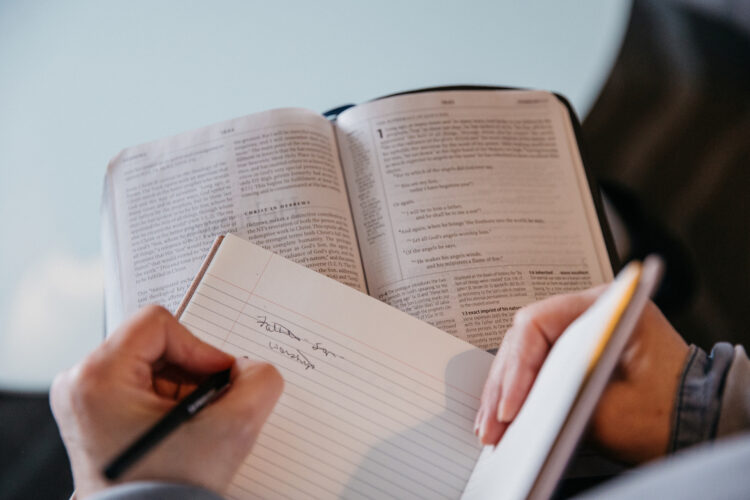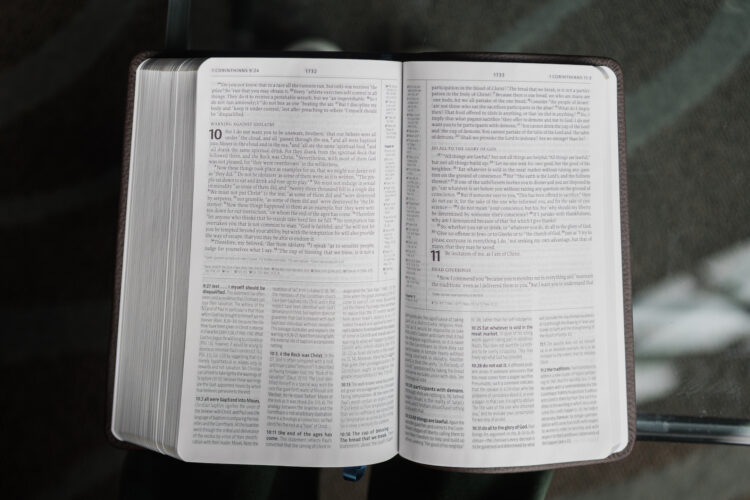“This is what the Lord, the God of Israel, says: ‘Write in a book all the words I have spoken to you.”
Jeremiah 30:2
My first journal was given to me by my friend Nancy shortly after she introduced me to Jesus. She gave it to me on one of our Saturday morning visits, sitting in the old Northwestern Books coffee shop as I asked her question after question about this new life. She had already handwritten scripture throughout it, but I wasn’t quite sure what I was supposed to write. So, I mostly copied her by adding more scripture that stood out to me as I pored over my new Bible, another gift from her. I didn’t fully realize then that the scripture that stood out to me was God’s way of talking to me, of building a foundation of His truth in me.
Journaling as an Earpiece
My journaling has changed a little since those early days, but what hasn’t changed is how it’s still one of the primary ways I hear from God. The power of journaling lies in this: committing words to paper takes them from fuzzy, drifting concepts in our minds to concrete words that have shape and power and can give direction and encouragement. This clarity invites us to better understand what He’s saying, to draw closer to Him, and to more fully receive His guidance and love. This is one reason why I think many verses, like Jeremiah 30:2, tell God’s people to write.
My journal typically includes things like what I’m hearing from God, what I want to say to Him, a few written prayers, concepts I’m wrestling with, and feelings or situations I’m submitting to Him.
Before you read that and feel defeated or overwhelmed, thinking that’s a lot to try to do, let me tell you that I don’t do all of those things every day! Truth be told, there are days that I don’t write a single word. Some days I write what I’m hearing; other days it’s prayers; sometimes I record feelings. The most consistent part of my journaling is SOAP. (If you aren’t familiar with SOAP, which is our church’s bible reading plan, you can head to our website to learn more.)
The A in SOAP stands for “apply”, telling us to apply what we just read to our lives today, whether it’s Old Testament wisdom or practical applications from one of Paul’s letters. It’s remarkable that when we ask Him how He wants us to apply the words He inspired thousands of years ago to today, He tells us! Truly, the Word is living and active!
For me, I write what He says because, otherwise, it would be too easy to sloppily breeze over the application and jump to prayer, missing out on one of the most life-changing elements of Bible study. When my marker starts writing, I hear more of what He was already saying, and He tells me more than He would’ve otherwise. I mean, why not? It makes sense! If one of my sons asked for advice and wrote it down as we talked, I’d be more thorough and nurturing too, knowing I had his full attention.
In this COVID-19 environment of uncertainty, pivots, loss, and physical distancing, I am clinging to Him and needing a fresh word every day. And journaling helps with that. Journaling is like the earpiece on an audio tour at a museum. I can walk through the museum on my own and learn much, or I can choose to focus on what the Teacher wants to tell me and learn so much more.
Journaling as an Altar
It’s funny how when I go back into my old journals to look for an entry, my intention to spend five minutes can easily turn into 30—or more, if I have time. Looking back through my journal on sleepy mornings curled in a blanket with squinty eyes, with the advantage of hindsight, I can see I really was with God. The words, sentiments, and thoughts couldn’t all have come from this sinner’s heart. I sat with a co-author.
In my experience, that’s another reason God’s Word tells us to record our interactions with God: my journal is tangible proof of His faithfulness behind me. In the Old Testament, they built altars of remembrance to commemorate when God had moved for them. In difficult times, they’d return to the altars to remind themselves of His past faithfulness, taking assurance in the fact that if He did it then, He can do it again. Many of my previous journal entries are altars, and I’m relishing them as I wait for us to be on the other side of this pandemic.
The Art of Journaling
There are many ways to journal. I like to think of it as a creative art in that we get to partner with God to create our own journaling rhythms. For me, after SOAP, there’s no formula for how I splat down words, which are often hardly legible. My best friend has the same journal as me; it keeps us connected so sweetly, and that helps me keep up the discipline, because I’ve learned that the more I like my journal, the more time I’ll spend in it. I’ve also learned, thanks to another friend, that I really enjoy journaling in different colors.
One Method: Immanuel Journaling
A really impactful method for me lately, as I wade through the identity, purpose, and idol issues COVID is bringing up for me (and probably many of us), is a process called Immanuel Journaling, which I learned about through Dallas Willard Ministries. Immanuel Journaling a way of journaling that’s even more intentional about hearing God’s voice. It’s concept is based on Exodus 3:7-8a, when God speaks to Moses out of the burning bush:
The Lord said, “I have indeed seen the misery of my people in Egypt. I have heard them crying out because of their slave drivers, and I am concerned about their suffering. So I have come down to rescue them from the hand of the Egyptians and to bring them up out of that land into a good and spacious land.”
Notice how God tells Moses that He sees His people, hears them, cares about them, is with them, and will do something for them. Immanuel Journaling follows this template of how God is attuned to us, drawing us in to see how soft His heart is towards us, so we can more openly receive his compassion and direction.
Immanuel Journaling requires a bit of time, so make sure you have at least 15 minutes set aside. The steps are a bit broad, but that’s intentional because it leaves more room for your creative process and how this type of journaling will look for you.
- STEP ONE: Interactive Gratitude
- Gratitude awakens our awareness of God. Write down some of the things you’re thankful for. Then, write God’s response to your gratitude.
- STEP TWO: I Can See You
- Write from God’s perspective about what He observes in you right now, including your physical sensations. Example: I can see you at your desk that’s now your home office. You look tired and a little out of place. Your shoulders are tight….
- STEP THREE: I Can Hear You (without Judgement)
- Again, write from God’s perspective, this time about what He hears you saying to yourself. Example: You are wondering if I will speak to you. You’re asking when this will be over and when you’ll be able to hug your grandchildren.
- STEP FOUR: I Understand how Big This Is for You
- How does God see your present situation and validate you? Example: I want you to know that I care about what matters to you. I understand how unsettling this feels. There are moments you feel like you’re sinking….
- STEP FIVE: I Am Glad to Be with You and Treat You Tenderly
- How does God express his love and desire to participate in your life? Example: I understand you’re frustrated and confused. I want to be closer to you….
- STEP SIX: I Can Help You
- What does God have for you or how does he guide you in this time? Example: Come away with me. I offer you times of refreshment, new energy, and vision….
- STEP SEVEN: Read Aloud
This last step takes courage: read what you have written aloud, ideally to someone else. Reading takes our experience to another level. Reading it to someone else can help us overcome our shame, show our joy and peace, and build accountability.
I pray that in this season of slowed-down life, you set aside extra time to journal, and that, in doing so, you discover greater clarity in your earpiece, comfort in your altars, and new ways of hearing from Him.








